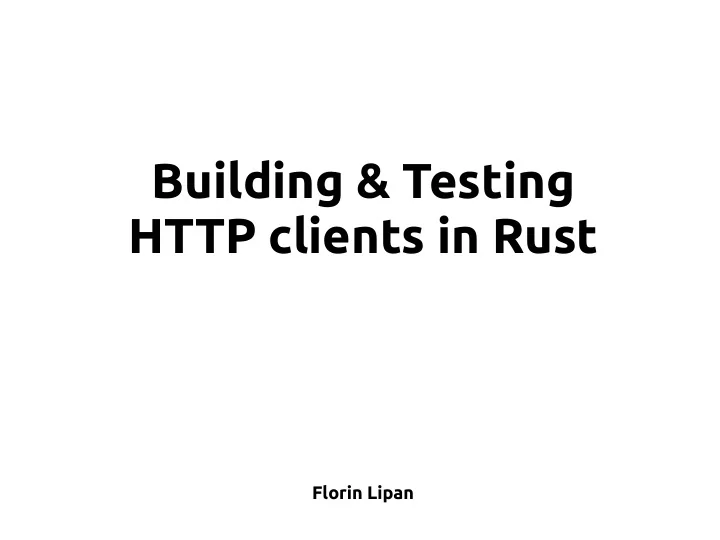

Building & Testing HTTP clients in Rust Florin Lipan
Why?
Good old TcpStream use std::net::{TcpStream, Shutdown}; use std::io::{Read, Write}; let mut stream = TcpStream::connect(“example.com:80”).unwrap(); stream .write_all(b”GET / HTTP/1.1\nHost: example.com\n\n”) .unwrap(); let mut response = String::new(); stream .take(10) .read_to_string(&mut response) .unwrap(); // stream.shutdown(Shutdown::Both);
A better Reader... use std::io::{BufRead, BufReader}; // ... let mut reader = BufReader::new(stream); let mut lines = reader.lines(); let mut status_line: String = lines.next().unwrap().unwrap(); println!(“status: {}”, status_line); // => HTTP/1.1 200 OK let mut header_lines: Vec<String> = lines .take_while(|line| line.as_ref().unwrap() != “\r\n”) .map(|line| line.unwrap()) .collect(); // => Content-Length
Why not? - No SSL, but there are openssl bindings for Rust - SSL is scarry - Verbose - Blocking reads/writes (?), but set_nonblocking() landed in 1.9
hyper extern crate hyper; use hyper::client::Client; use hyper::status::{StatusCode, StatusClass}; let mut response = Client::new() .get("https://www.example.com/") .send() .unwrap(); match response.status { StatusCode::Ok => { println!("success!") }, _ => { println!("meh") }, } // => success! match response.status.class() { StatusClass::Success => { println!("yay!") }, _ => { println!("nay") }, }
Bit of JSON... extern crate rustc_serialize; use rustc_serialize::json; #[derive(RustcDecodable)] struct Board { name: String, desc: String, } let mut response = Client::new() .get("https://api.trello.com/1/members/me/boards?token=x&key=y") .send() .unwrap(); let mut body = String::new(); response.read_to_string(&mut body).unwrap(); let boards: Vec<Board> = json::decode(&body).unwrap(); let first_board = boards.first().unwrap(); println!(“first board: {}”, first_board.name);
...and the other way around #[derive(RustcEncodable)] struct Board { name: String, desc: String, } let board = Board { name: "demo".to_string(), desc: "just a demo board".to_string(), }; let body = json::encode(&board).unwrap(); let mut response = Client::new() .post("https://api.trello.com/1/boards?token=x&key=y") .header(ContentType::json()) .body(&body) .send() .unwrap();
Other options? - http_muncher = bindings for the Node HTTP parser, supports upgrade connections - solicit = HTTP/2 - rust-http = not maintained - TeePee = not developed yet (?)
So how do I test these things?
hyper (internally) test! { name: client_get, server: expected: "GET / HTTP/1.1\r\nHost: {addr}\r\n\r\n", reply: "HTTP/1.1 200 OK\r\nContent-Length: 0\r\n\r\n", client: request: method: Get, url: "http://{addr}/", response: status: Ok, headers: [ ContentLength(0), ], body: None } // assert_eq!(s(&buf[..n]), format!($server_expected, addr=addr)); // inc.write_all($server_reply.as_ref()).unwrap(); // + client asserts
hyper-mock // https://github.com/Byron/yup-hyper-mock #[cfg(test)] mod tests { use hyper::Client; use hyper::status::StatusCode; mock_connector!(MockStatus { "https://127.0.0.1" =>"HTTP/1.1 200 OK\r\n\Server: mock\r\n\r\n\" }); #[test] fn test_status_ok() { let mut client = Client::with_connector(MockStatus::default()); let response = client.get("http://127.0.0.1").send().unwrap(); assert_eq!(StatusCode::Ok, response.status); } }
(drumroll)
Finally a crate with a logo (tm)
Concept - An HTTP server (based on hyper) running on port 1234, on a separate thread of your application - Set the HOST via compiler flags: `#[cfg(test)]` vs. `#[cfg(not(test))]` - Simple interface
Basic example (1) #[cfg(test)] extern crate mockito; #[cfg(test)] use mockito; #[cfg(test)]] const HOST: &’static str = mockito::SERVER_URL; #[cfg(not(test))] const HOST: &’static str = “https://api.trello.com”; fn request() -> Response { Client::new() .get([HOST, “/1/members/me/boards?token=x&key=y”].join(“”)) .send() .unwrap() }
Basic example (2) #[cfg(test)] mod tests { use mockito::mock; use hyper::status::StatusCode; use {request}; #[test] fn test_request_is_ok() { mock(“GET”, “/1/members/me/boards?token=x&key=y”) .with_body(“{}”) .create(); let response = request(); assert_eq!(StatusCode::Ok, response.status); } }
Matching headers mock("GET", "/hello") .match_header("accept", "text/json") .with_body("{'hello': 'world'}") .create(); mock("GET", "/hello") .match_header("accept", "text/plain") .with_body("world") .create();
Other options // Set response status mock(“GET”, “/hello”) .with_status(422) .with_body(“”) .create(); // Set response headers mock(“GET”, “/hello”) .with_header(“content-type”, “application/json”) .with_header(“x-request-id”, “1234”) .with_body(“”) .create(); // Read response body from a file mock(“GET”, “/hello”) .with_body_from_file(“path/to/file”) .create();
Cleaning up // Closures mock(“GET”, “/hello”) .with_body(“world”) .create_for(|| { // Mock only available for the lifetime of this closure assert!(...) }); // Manually let mut mock = mock(“GET”, “/hello”); mock .with_body(“world”) .create(); assert!(...) mock.remove();
Compiler fmags (1) #[cfg(feature=”mock”)] const HOST: &’static str = mockito::SERVER_URL; #[cfg(not(feature=”mock”))] const HOST: &’static str = “https://api.trello.com”; #[cfg(test)] mod tests { #[test] #[cfg(feature=”mock”)] fn test_with_a_mock() { // will run only if the mock feature is enabled } #[test] #[cfg(not(feature=”mock”))] fn test_without_a_mock() { // will run only if the mock feature is disabled } #[test] fn test_dont_care() { // will run all the time } }
Compiler fmags (2) // Cargo.toml [features] default = [] mock = [] other = [] // will run without the `mock` feature cargo test // will run with the `mock` feature cargo test --features mock // will run the `mock` and the `other` feature cargo test --features “mock other”
Drawbacks - Port 1234 - Projects requiring multiple hosts, but conflicts can be avoided - Using `hyper::status::StatusCode::Unregistered` which labels every status as `<unknown status code>`: e.g. `201 <unknown status code>` - Fresh off the machine
- https://github.com/lipanski/mockito - https://github.com/lipanski/trello-rs - https://github.com/Byron/yup-hyper-mock - https://github.com/hyperium/hyper - https://github.com/kbknapp/clap-rs (lovely CLI argument parser) - Logo courtesy to http://niastudio.net Questions?
Recommend
More recommend